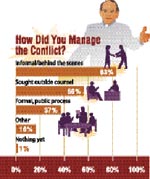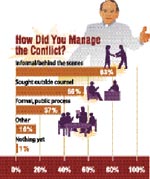If five pastors are sitting at a table, in most cases all five of them can tell the story of a major conflict in their church, and one of them can describe a battle that's raging right now. Conflict is common in the body of Christ, but must it be debilitating? Disagreements are to be expected, but must the way Christians settle their disputes-too often nasty-be our defining characteristic?
Our recent survey says it shouldn't, but it often is.
We also have good news. While 95% of pastors report having experienced conflict, and 20% are enduring conflict right now, almost all of the pastors we polled reported at least some positive outcomes.
In spring 2004, Leadership surveyed 506 readers who are pastors. The results have an accuracy of plus or minus 4.36 points.
What do we fight about?
Jokes about the color of the carpet aside, who makes the decisions is a big issue in most churches. In our survey, pastors checked all the sources of conflict from a list (see graphic, right) and 85% of them cited control as a leading contributor. Matters of doctrine or cultural issues ranked low compared to power and personal preference. When we asked pastors to name the most likely cause, again control (44%) outdistanced the other factors, with vision/direction a remote second (22%).
Size matters: We found this especially true in congregations of 200 or less. Some 49% of pastors of smaller churches said control is the number one problem, compared to less than one-third (31%) of churches of 500 or more.
Who knew about the conflict? |
|
| A small group | 46% |
| A large group | 30% |
| Most of congregation | 24% |
Congregation size also affects how widespread the conflict becomes. The old comment, "There were just a few people behind it" is often the case. But we found this interesting statistic: Pastors of larger churches were more likely to say only a small group of people knew, but in congregations under 200, the news was not so easily contained. Congregants were the likely ones to report conflict to the pastor (77%), but in larger churches, church staff were the first sentinels (51% in churches over 500).
How did you feel about the conflict? |
|
| Angry | 51% |
| Defensive | 51% |
| Overwhelmed | 34% |
| Shocked | 32% |
| Confident | 21% |
| Compassionate | 19% |
| Sympathetic | 9% |
| Peaceful | 6% |
| Apathetic | 2% |

About four in ten pastors (38%) told us they had left a pastoral position due, at least in part, to conflict. The harsh initial feelings and residual hurts are not easily assuaged, and many pastors move on because of it.
We wondered how often the conflict becomes personal, focusing on the pastor or his family rather than a church issue. A great majority of respondents (71%) said the conflict eventually centered on them-their vision or pastoral style-but only a sliver (8%) said conflict focused on their family members.
How did you manage the conflict?
Our chart shows that many pastors try to handle disputes privately, at least at first. This is one of those "check all that apply" questions, and it seems to indicate that most pastors are attempting to use the Matthew 18 method of beginning one-on-one before expanding to elder and whole-church involvement. When pastors felt the conflicts were personal in nature, they were more likely to rely on informal resolution, taking the process public less than one-fourth of the time (23%). In the anecdotal portion of the survey, many pastors said they wish they had responded more quickly to the conflict. Giving a sore spot time to heal more often allowed it to fester, we were told.
What were the positive outcomes of the conflict? |
|
| I'm wiser | 72% |
| purifying process | 44% |
| better defined vision | 42% |
| better communication with congregation | 35% |
| stronger relationships | 30% |
| reconciliation | 16% |
| growth in attendance | 16% |
Will any good come of this? Respondents to our poll said yes (94%), although the outcomes are often within the pastor, or spiritual in nature. We asked, "What were your feelings about the outcomes of the conflict?" We were encouraged that the top answer was stronger (60%), followed by hopeful (35%), and thankful (32%).
The pastors' residual negative feelings were at the bottom of the "feelings charts," but they are still noteworthy because one-fourth of our colleagues say they are broken because of the conflict (26%), and confused (16%). And one in ten (9%) reminded us that the conflict isn't over.
Some hopeful signs, pastors who stayed after a conflict were less likely to describe themselves as broken (15% compared to 42%). And pastors of larger churches were more likely to say they felt hopeful afterward.
And the negative outcomes? |
|
| damaged relationships | 68% |
| sadness | 58% |
| decline in attendance | 32% |
| leaders left the church | 32% |
| loss of trust | 31% |
| bitterness | 29% |
| loss of communication with congregation | 3% |
Apart from the pastor's personal hurts, the collateral damage of conflict in the church is mostly in relationships. By the way congregations handle disputes, personal friendships are damaged in more than two-thirds of the cases; for almost as many a sadness remains long after the fighting has ceased.
Like the 38% of pastors who eventually leave, a similar number of members and leaders look for a new church.
Conflict is inevitable, no matter the size of the group. While the stuff of church jokes, conflict is rarely funny when you're living through it, but eventually…
Remember the one about the man who was stranded on a deserted island? After some months the rescue boat arrived. The captain asked the castaway, "What are those three huts?"
"That's my house and that's my church," the man answered, pointing.
"And what's that one over there?"
"Oh, that's where I used to go to church."
Copyright © 2004 by the author or Christianity Today/Leadership Journal.Click here for reprint information onLeadership Journal.










